
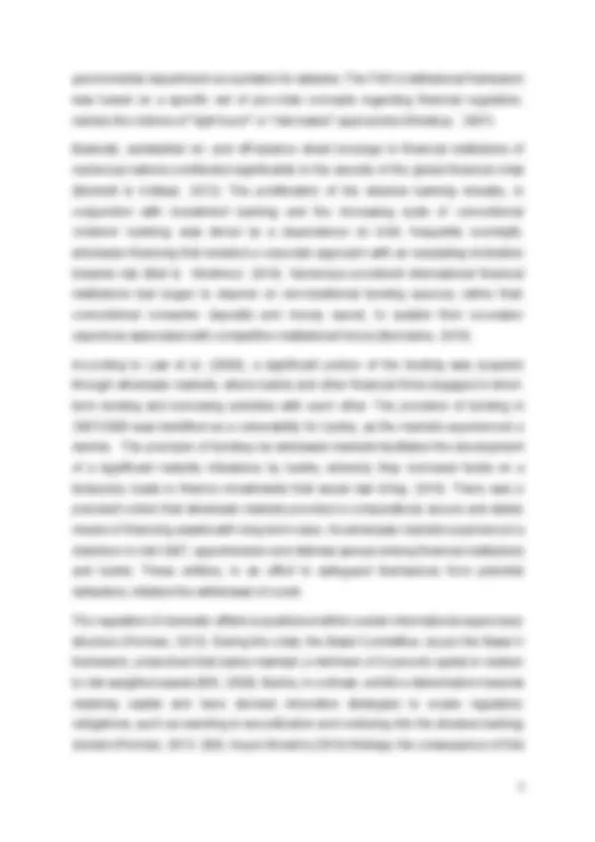
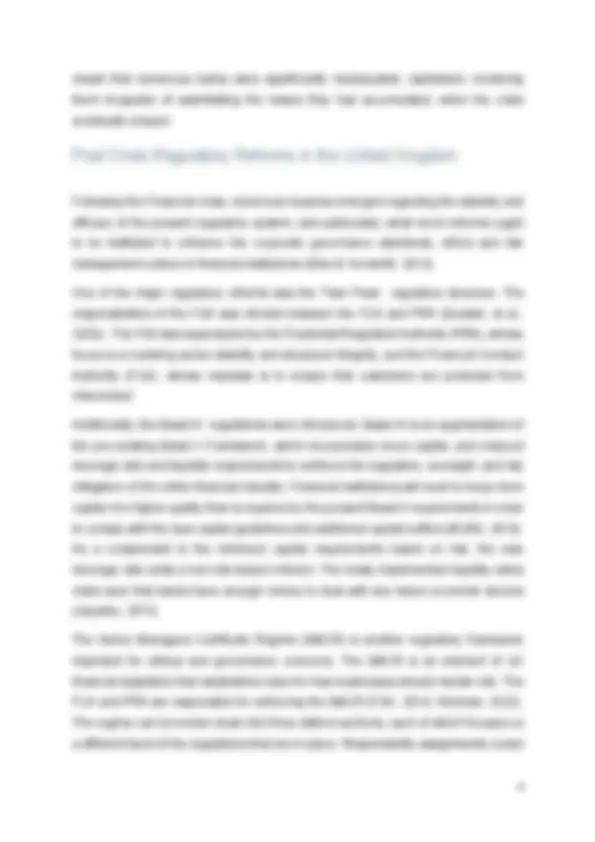
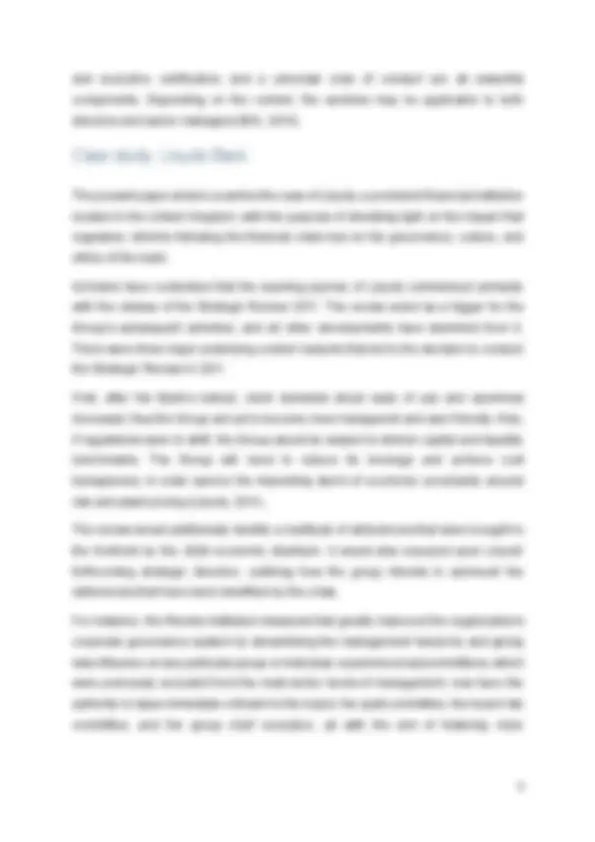
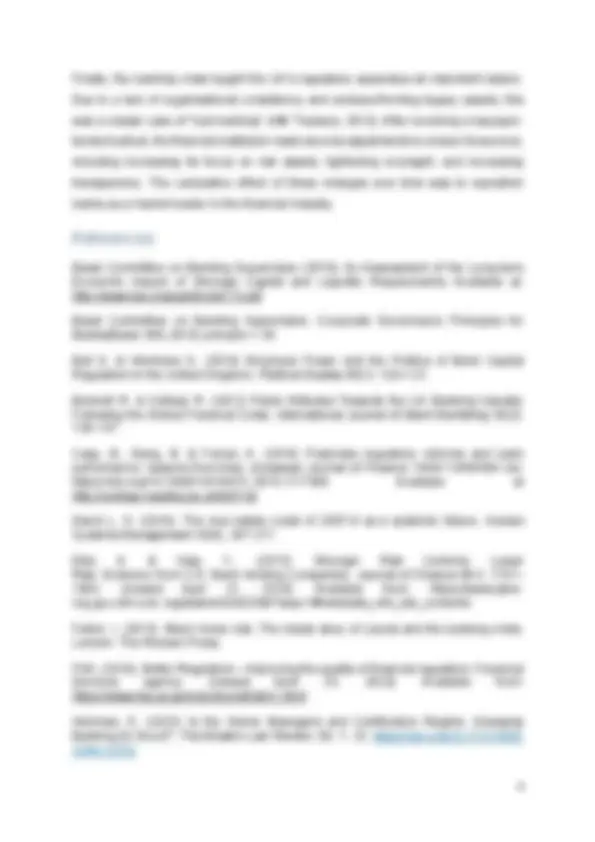
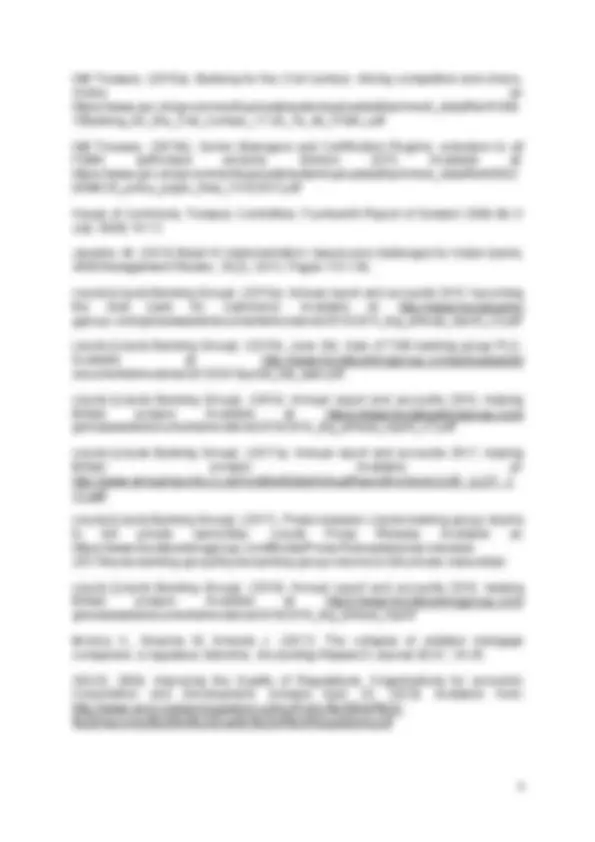



Study with the several resources on Docsity

Earn points by helping other students or get them with a premium plan


Prepare for your exams
Study with the several resources on Docsity

Earn points to download
Earn points by helping other students or get them with a premium plan
Community
Ask the community for help and clear up your study doubts
Discover the best universities in your country according to Docsity users
Free resources
Download our free guides on studying techniques, anxiety management strategies, and thesis advice from Docsity tutors
A CRITICAL ASSESSMENT OF THE UK'S REGULATORY REGIME PRE & POST THE GLOBAL FINANCIAL CRISIS: A CASE OF LLOYDS BANK
Typology: Study Guides, Projects, Research
1 / 10

This page cannot be seen from the preview
Don't miss anything!







The global financial crisis that occurred between 2007 and 2008 demonstrated the adverse effects of inadequate adaptability within the banking sector. This led to extensive economic turmoil and the provision of financial assistance to institutions by taxpayers (Romer & Romer, 2015). Lehman Brothers Holdings, an American investment firm, was the catalyst for the worldwide financial crisis (Keneley, 2017). Financial institutions that provide credit were heavily implicated in the subprime mortgage crisis as they were the ones issuing mortgage securities that were doomed to fail (Monica, et al., 2017). Extensive dual leveraging and the unmanageable expansion of secondary markets in credit derivatives set in motion a chain of events that ultimately led to the failure of big bank, and this resulted in profound consequences for the overall economy. After the worldwide financial collapse, authorities were once again compelled to question the role of law in addressing failures in markets and limiting risks (Casu, et al., 2016; David, 2016). The purpose of this research is to provide an in-depth analysis of the United Kingdom's regulatory system before, during, and after the 2008 financial crisis, focusing on the most pressing concerns that arose in the context of regulatory mandates and supervisory oversight. In addition, it will focus on Lloyds Bank Plc and its involvement in the crisis, as well as the responses of regulators and the solutions they implemented. The ways in which financial institutions have improved their risk management procedures in the wake of the crisis will be assessed. Additionally, the study will offer recommendations for moving forward with the goal of strengthening and improving regulators' efficacy in their oversight delivery within the banking sector.
Preceding the crisis, a tripartite regulatory framework was implemented in 1997, whereby the charge for financial health was distributed among three entities: the Bank of England, which oversaw monetary policy; the FSA, a unified supervisory agency for financial institutions, insurance companies, and securities; and the Treasury, the
meant that numerous banks were significantly inadequately capitalised, rendering them incapable of assimilating the losses they had accumulated, when the crisis eventually ensued.
Following the Financial crisis, numerous inquiries emerged regarding the stability and efficacy of the present regulatory system, and particularly, what novel reforms ought to be instituted to enhance the corporate governance standards, ethics and risk management culture in financial institutions (Ellul & Yerramilli, 2013). One of the major regulatory reforms was the ‘Twin Peak’ regulatory structure. The responsibilities of the FSA was divided between the FCA and PRA (Godwin, et al., 2020). The FSA was superseded by the Prudential Regulation Authority (PRA), whose focus is on banking sector stability and structural integrity, and the Financial Conduct Authority (FCA), whose mandate is to ensure that customers are protected from misconduct. Additionally, the Basel III regulations were introduced. Basel III is an augmentation of the pre-existing Basel II Framework, which incorporates novel capital, and reduced leverage ratio and liquidity requirements to reinforce the regulation, oversight, and risk mitigation of the entire financial industry. Financial institutions will need to keep more capital of a higher quality than is required by the present Basel II requirements in order to comply with the new capital guidelines and additional capital buffers (BCBS, 201 0 ). As a complement to the minimum capital requirements based on risk, the new leverage ratio adds a non-risk-based criterion. The newly implemented liquidity ratios make sure that banks have enough money to deal with any future economic shocks (Jayadev, 2013). The Senior Managers Certificate Regime (SMCR) is another regulatory framework important for ethical and governance concerns. The SMCR is an element of UK financial legislation that establishes rules for how businesses should handle risk. The FCA and PRA are responsible for enforcing the SMCR (FSA, 2019; Hickman, 2022). The regime can be broken down into three distinct sections, each of which focuses on a different facet of the regulations that are in place. Responsibility assignments, board
and executive certification, and a universal code of conduct are all essential components. Depending on the context, the sections may be applicable to both directors and senior managers (BIS, 2015).
The present paper aims to examine the case of Lloyds, a prominent financial institution located in the United Kingdom, with the purpose of shedding light on the impact that regulatory reforms following the financial crisis had on the governance, culture, and ethics of the bank. Scholars have contended that the learning journey of Lloyds commenced primarily with the release of the Strategic Review 2011. The review acted as a trigger for the Group's subsequent activities, and all other developments have stemmed from it. There were three major underlying context reasons that led to the decision to conduct the Strategic Review in 2011. First, after the Bank's bailout, client demands about ease of use and openness increased, thus the Group set out to become more transparent and user-friendly. Also, if regulations were to shift, the Group would be subject to stricter capital and liquidity benchmarks. The Group will need to reduce its leverage and achieve cost transparency in order survive the impending storm of economic uncertainty around risk and asset pricing (Lloyds, 2011). The review would additionally identify a multitude of deficiencies that were brought to the forefront by the 2008 economic downturn. It would also expound upon Lloyds' forthcoming strategic direction, outlining how the group intends to surmount the deficiencies that have been identified by the crisis. For instance, the Review instituted measures that greatly improved the organization's corporate governance system by streamlining the management hierarchy and giving less influence on any particular group or individual. experienced subcommittees, which were previously excluded from the most senior levels of management, now have the authority to issue immediate criticism to the board, the audit committee, the board risk committee, and the group chief executive, all with the aim of fostering more
it has been suggested that the involvement of society in the beginning phases of decision-making could aid agencies in determining the optimal course of action, promote fairness in the process, and potentially mitigate the likelihood of unforeseen disputes arising from the end result (ACCF, 2017). The Financial Services Agency (FSA, 2019) suggests that enhancing cooperation with international authorities and expanding investigative functions to perceive market developments would have a significant impact on enhancing the regulatory system, as doing so would boost the overall financial system's credibility through better understanding the consequences economic conditions and market actions on organisations. FSA (2019) argues that better communication with financial institutions is essential for more responsible regulation because it would not only help institutions plan for potential enforcement measures, but also shape the behaviour of the financial sector as a whole. In spite of this, OECD (2009) notes that regulators' future work will involve boosting the efficacy of improved regulations and establishing constant improvements in these modifications to account for emerging issues. They also note that, while reforms in times of crisis can be challenging to implement, they are crucial because it is in this way that novel approaches to risk management can be discovered.
In conclusion, the global financial crisis presented numerous challenges for companies, people, and financial organisations, and it prompted discussions about the efficacy of the existing regulatory structure and about what modifications should be made to the system to prevent or lessen the impact of future surprises to financial markets. In addition, it has brought to light the critical importance of bolstering regulation at the micro as well as the macro levels, particularly by better managing systemic risk. believes that because the markets have improved, the focus has shifted from causing the current crisis to preventing further crises from occurring (Weber, 2010).
Finally, the banking crisis taught the UK's regulatory apparatus an important lesson. Due to a lack of organisational consistency and underperforming legacy assets, this was a classic case of "bad banking" (HM Treasury, 2013). After receiving a taxpayer- funded bailout, the financial institution made several adjustments to ensure its survival, including increasing its focus on risk assets, tightening oversight, and increasing transparency. The cumulative effect of these changes over time was to reposition banks as a market leader in the financial industry.
Basel Committee on Banking Supervision ( 2010 ). An Assessment of the Long-term Economic Impact of Stronger Capital and Liquidity Requirements. Available at: http://www.bis.org/publ/bcbs173.pdf. Basel Committee on Banking Supervision, Corporate Governance Principles for Banks(Basel: BIS,2015) principle 1. Bell S. & Hindmoor A. (2016) Structural Power and the Politics of Bank Capital Regulation in the United Kingdom. Political Studies 65(1): 103–121. Bennett R. & Kottasz R. (2012) Public Attitudes Towards the UK Banking Industry Following the Global Financial Crisis. International Journal of Bank Marketing 30(2): 128 – 147 Casu, B., Deng, B. & Ferrari, A. (2016) Postcrisis regulatory reforms and bank performance: lessons from Asia. European Journal of Finance. ISSN 14664364 doi: https://doi.org/10.1080/1351847X.2016.1177566 Available at http://centaur.reading.ac.uk/64710/ David L. O. ( 2016 ). The real estate crash of 2007-8 as a systemic failure. Human Systems Management 35 ( 4 ), 267-277. Ellul, A. & Vijay, Y., ( 2013 ). Stronger Risk Controls, Lower Risk: Evidence from U.S. Bank Holding Companies. Journal of Finance 68.5. 1757 –
Romer, C., & Romer, H. ( 2015 ). “New Evidence on the Impact of Financial Crises in Advanced Countries.” NBER Working Paper 21021, March, available at: www.nber.org/papers/w21021. Weber, A., ( 2010 ) Banking Regulation. Bank for International Settlements, March